Ethical Marketing and Consumer Behavior: Literature Review
VerifiedAdded on 2022/08/21
|13
|2633
|13
Literature Review
AI Summary
This literature review examines the existing literature on ethical marketing and its influence on consumer behavior. It investigates the factors motivating consumers to choose products based on ethical considerations, including ethical sourcing, green marketing claims, and brand ethics. The review analyzes various studies, including those focusing on the impact of sustainability claims, the role of ethical trade, and the psychological aspects of consumer choices. It covers diverse industries like coffee, apparel, and construction, highlighting how ethical practices are evolving beyond the food industry. The review also explores the role of brand reputation, fair trade practices, and the implications of ethical marketing on consumer attitudes and purchasing decisions, identifying gaps in the current research and suggesting areas for future exploration. The review utilizes a systematic approach, analyzing the search process, critical analysis of literature and the implications and conclusion of the study. The literature review also includes a table to summarise the key findings from the articles reviewed.
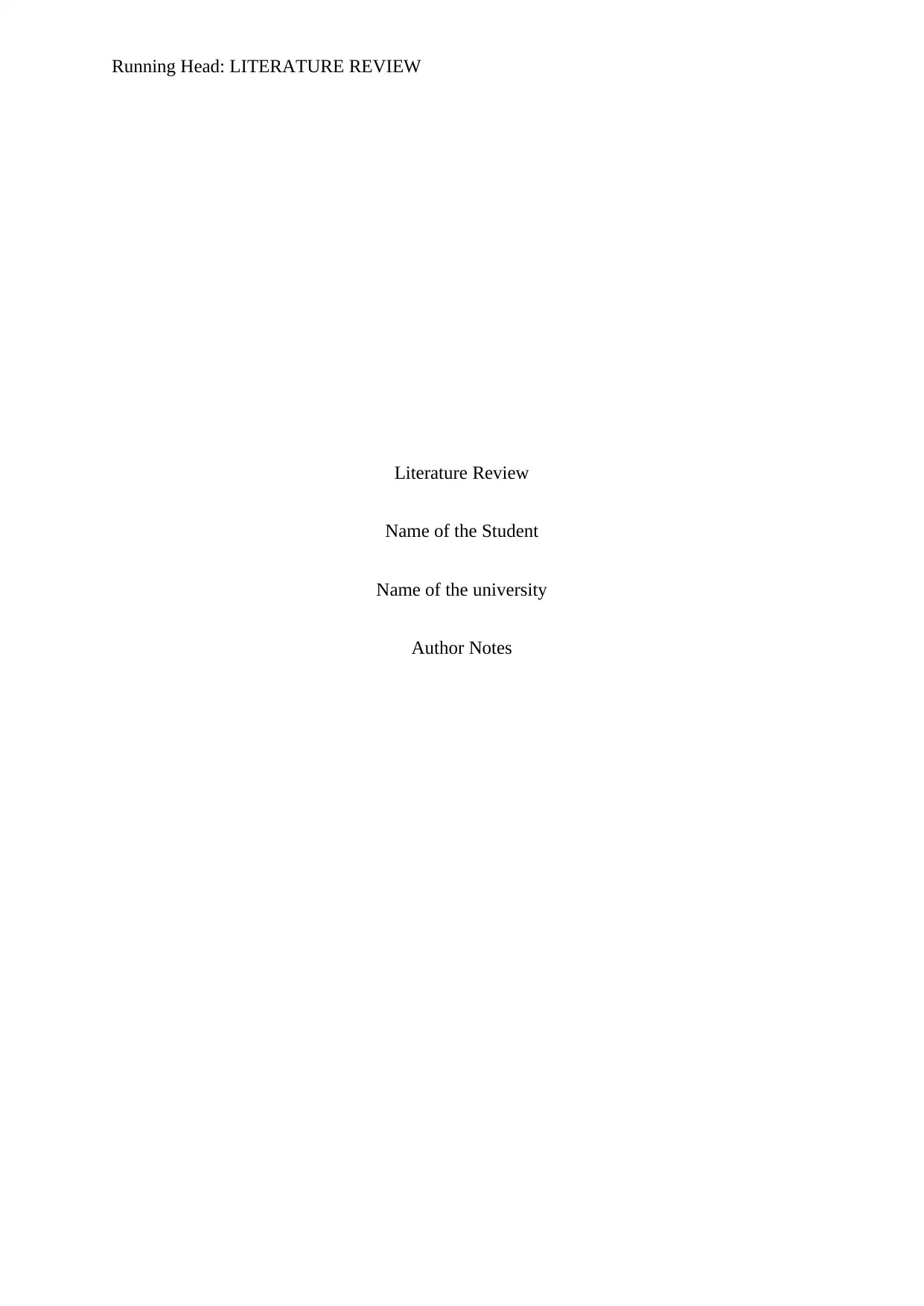
Running Head: LITERATURE REVIEW
Literature Review
Name of the Student
Name of the university
Author Notes
Literature Review
Name of the Student
Name of the university
Author Notes
Paraphrase This Document
Need a fresh take? Get an instant paraphrase of this document with our AI Paraphraser
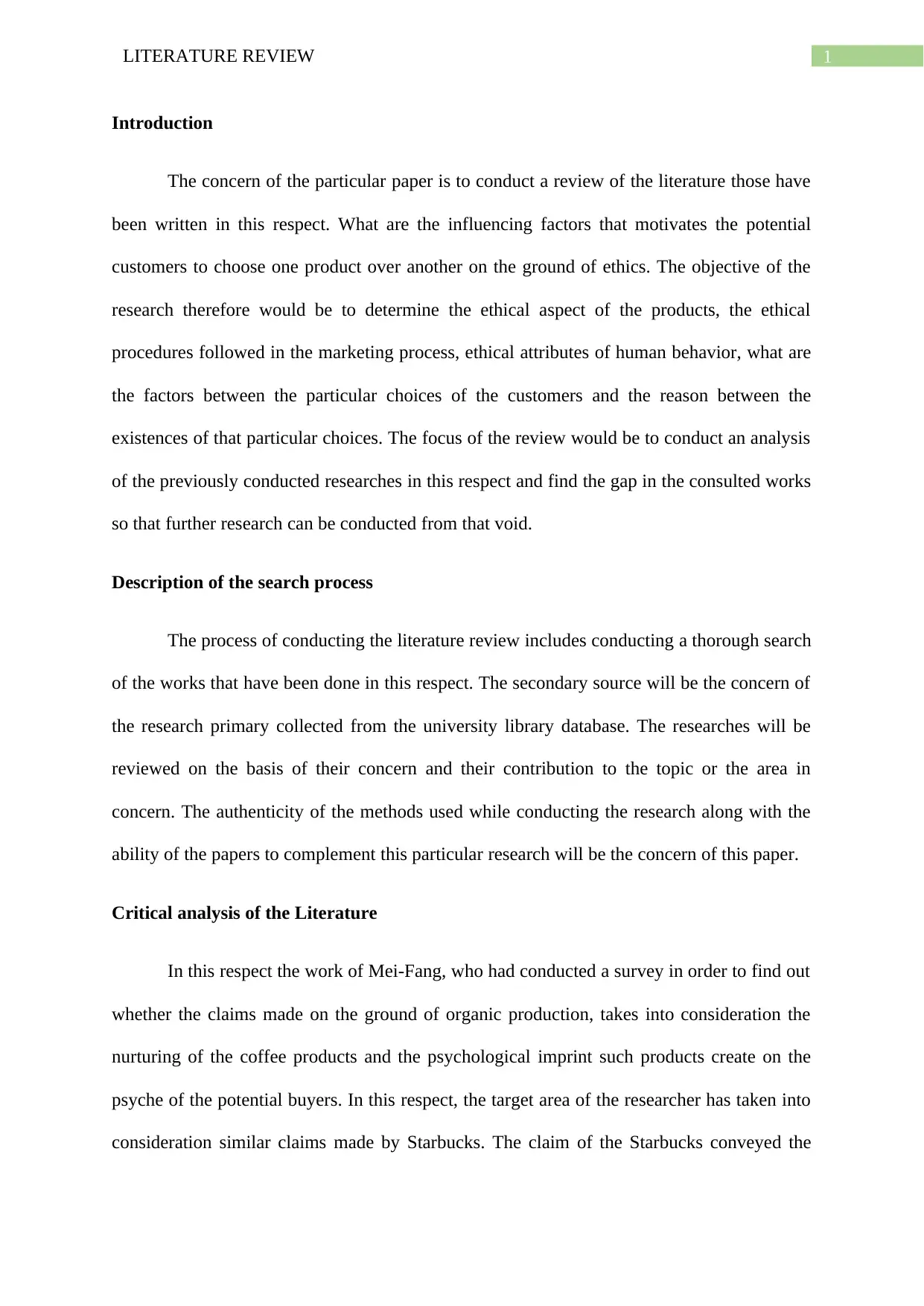
1LITERATURE REVIEW
Introduction
The concern of the particular paper is to conduct a review of the literature those have
been written in this respect. What are the influencing factors that motivates the potential
customers to choose one product over another on the ground of ethics. The objective of the
research therefore would be to determine the ethical aspect of the products, the ethical
procedures followed in the marketing process, ethical attributes of human behavior, what are
the factors between the particular choices of the customers and the reason between the
existences of that particular choices. The focus of the review would be to conduct an analysis
of the previously conducted researches in this respect and find the gap in the consulted works
so that further research can be conducted from that void.
Description of the search process
The process of conducting the literature review includes conducting a thorough search
of the works that have been done in this respect. The secondary source will be the concern of
the research primary collected from the university library database. The researches will be
reviewed on the basis of their concern and their contribution to the topic or the area in
concern. The authenticity of the methods used while conducting the research along with the
ability of the papers to complement this particular research will be the concern of this paper.
Critical analysis of the Literature
In this respect the work of Mei-Fang, who had conducted a survey in order to find out
whether the claims made on the ground of organic production, takes into consideration the
nurturing of the coffee products and the psychological imprint such products create on the
psyche of the potential buyers. In this respect, the target area of the researcher has taken into
consideration similar claims made by Starbucks. The claim of the Starbucks conveyed the
Introduction
The concern of the particular paper is to conduct a review of the literature those have
been written in this respect. What are the influencing factors that motivates the potential
customers to choose one product over another on the ground of ethics. The objective of the
research therefore would be to determine the ethical aspect of the products, the ethical
procedures followed in the marketing process, ethical attributes of human behavior, what are
the factors between the particular choices of the customers and the reason between the
existences of that particular choices. The focus of the review would be to conduct an analysis
of the previously conducted researches in this respect and find the gap in the consulted works
so that further research can be conducted from that void.
Description of the search process
The process of conducting the literature review includes conducting a thorough search
of the works that have been done in this respect. The secondary source will be the concern of
the research primary collected from the university library database. The researches will be
reviewed on the basis of their concern and their contribution to the topic or the area in
concern. The authenticity of the methods used while conducting the research along with the
ability of the papers to complement this particular research will be the concern of this paper.
Critical analysis of the Literature
In this respect the work of Mei-Fang, who had conducted a survey in order to find out
whether the claims made on the ground of organic production, takes into consideration the
nurturing of the coffee products and the psychological imprint such products create on the
psyche of the potential buyers. In this respect, the target area of the researcher has taken into
consideration similar claims made by Starbucks. The claim of the Starbucks conveyed the
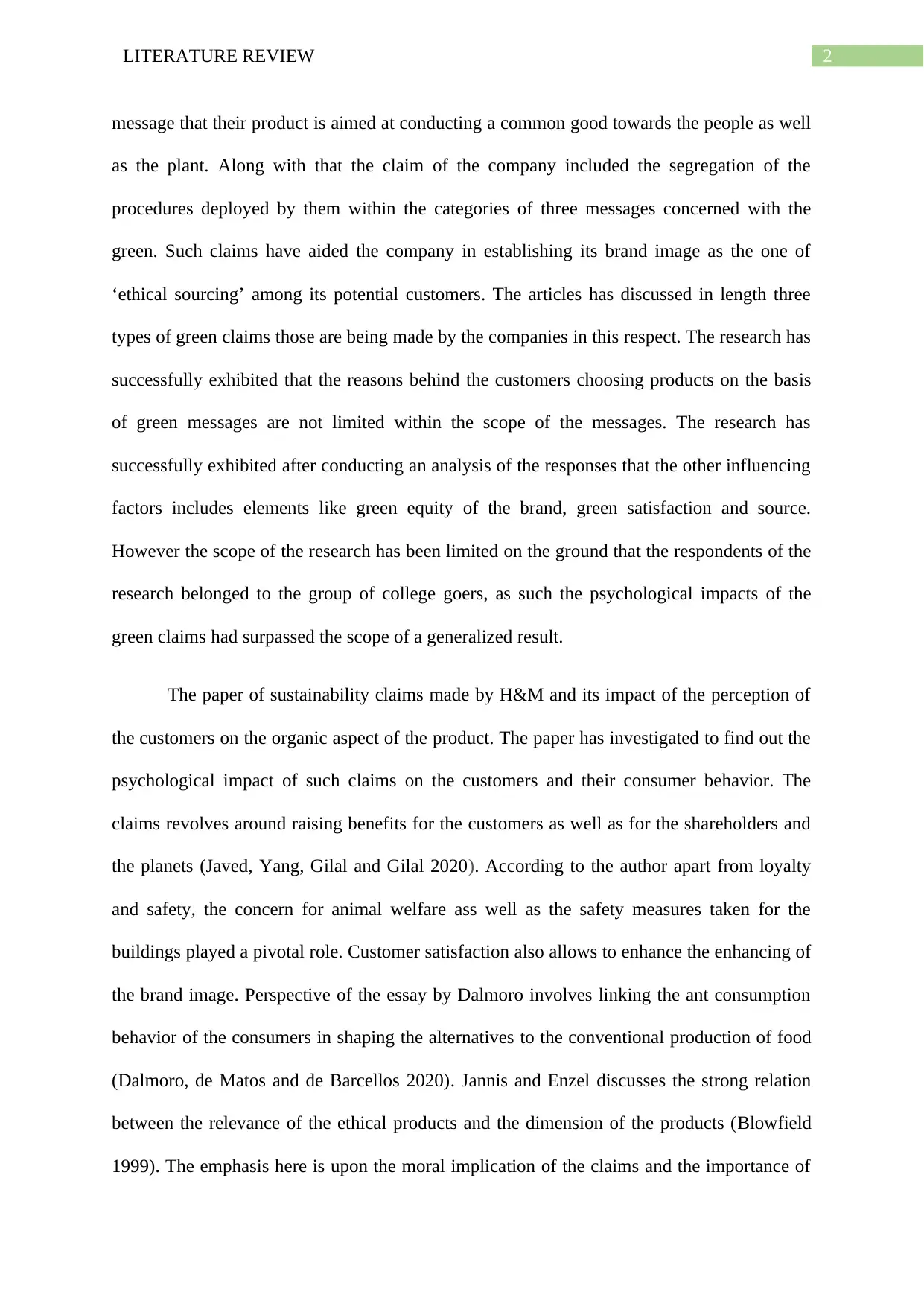
2LITERATURE REVIEW
message that their product is aimed at conducting a common good towards the people as well
as the plant. Along with that the claim of the company included the segregation of the
procedures deployed by them within the categories of three messages concerned with the
green. Such claims have aided the company in establishing its brand image as the one of
‘ethical sourcing’ among its potential customers. The articles has discussed in length three
types of green claims those are being made by the companies in this respect. The research has
successfully exhibited that the reasons behind the customers choosing products on the basis
of green messages are not limited within the scope of the messages. The research has
successfully exhibited after conducting an analysis of the responses that the other influencing
factors includes elements like green equity of the brand, green satisfaction and source.
However the scope of the research has been limited on the ground that the respondents of the
research belonged to the group of college goers, as such the psychological impacts of the
green claims had surpassed the scope of a generalized result.
The paper of sustainability claims made by H&M and its impact of the perception of
the customers on the organic aspect of the product. The paper has investigated to find out the
psychological impact of such claims on the customers and their consumer behavior. The
claims revolves around raising benefits for the customers as well as for the shareholders and
the planets (Javed, Yang, Gilal and Gilal 2020). According to the author apart from loyalty
and safety, the concern for animal welfare ass well as the safety measures taken for the
buildings played a pivotal role. Customer satisfaction also allows to enhance the enhancing of
the brand image. Perspective of the essay by Dalmoro involves linking the ant consumption
behavior of the consumers in shaping the alternatives to the conventional production of food
(Dalmoro, de Matos and de Barcellos 2020). Jannis and Enzel discusses the strong relation
between the relevance of the ethical products and the dimension of the products (Blowfield
1999). The emphasis here is upon the moral implication of the claims and the importance of
message that their product is aimed at conducting a common good towards the people as well
as the plant. Along with that the claim of the company included the segregation of the
procedures deployed by them within the categories of three messages concerned with the
green. Such claims have aided the company in establishing its brand image as the one of
‘ethical sourcing’ among its potential customers. The articles has discussed in length three
types of green claims those are being made by the companies in this respect. The research has
successfully exhibited that the reasons behind the customers choosing products on the basis
of green messages are not limited within the scope of the messages. The research has
successfully exhibited after conducting an analysis of the responses that the other influencing
factors includes elements like green equity of the brand, green satisfaction and source.
However the scope of the research has been limited on the ground that the respondents of the
research belonged to the group of college goers, as such the psychological impacts of the
green claims had surpassed the scope of a generalized result.
The paper of sustainability claims made by H&M and its impact of the perception of
the customers on the organic aspect of the product. The paper has investigated to find out the
psychological impact of such claims on the customers and their consumer behavior. The
claims revolves around raising benefits for the customers as well as for the shareholders and
the planets (Javed, Yang, Gilal and Gilal 2020). According to the author apart from loyalty
and safety, the concern for animal welfare ass well as the safety measures taken for the
buildings played a pivotal role. Customer satisfaction also allows to enhance the enhancing of
the brand image. Perspective of the essay by Dalmoro involves linking the ant consumption
behavior of the consumers in shaping the alternatives to the conventional production of food
(Dalmoro, de Matos and de Barcellos 2020). Jannis and Enzel discusses the strong relation
between the relevance of the ethical products and the dimension of the products (Blowfield
1999). The emphasis here is upon the moral implication of the claims and the importance of
⊘ This is a preview!⊘
Do you want full access?
Subscribe today to unlock all pages.

Trusted by 1+ million students worldwide
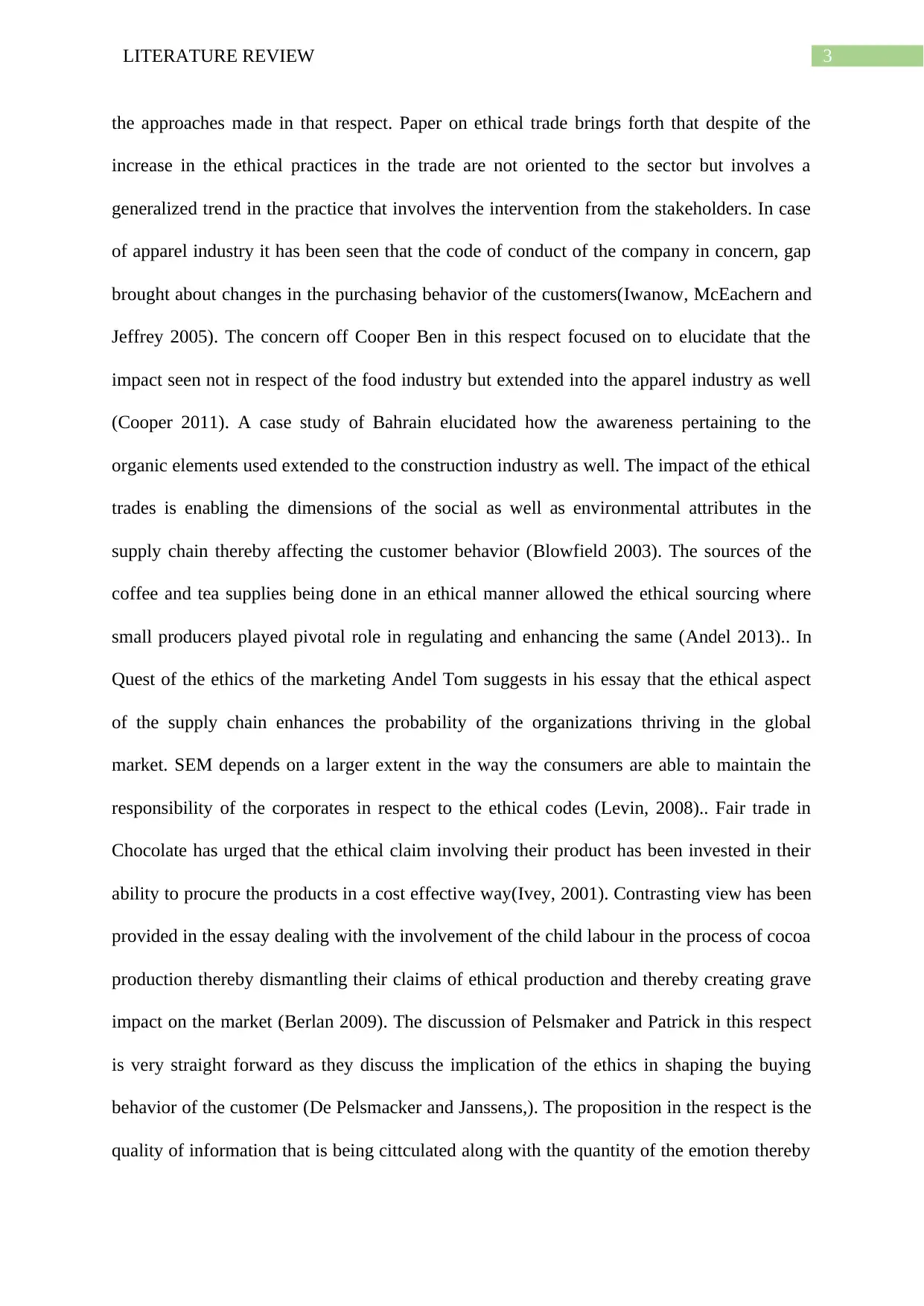
3LITERATURE REVIEW
the approaches made in that respect. Paper on ethical trade brings forth that despite of the
increase in the ethical practices in the trade are not oriented to the sector but involves a
generalized trend in the practice that involves the intervention from the stakeholders. In case
of apparel industry it has been seen that the code of conduct of the company in concern, gap
brought about changes in the purchasing behavior of the customers(Iwanow, McEachern and
Jeffrey 2005). The concern off Cooper Ben in this respect focused on to elucidate that the
impact seen not in respect of the food industry but extended into the apparel industry as well
(Cooper 2011). A case study of Bahrain elucidated how the awareness pertaining to the
organic elements used extended to the construction industry as well. The impact of the ethical
trades is enabling the dimensions of the social as well as environmental attributes in the
supply chain thereby affecting the customer behavior (Blowfield 2003). The sources of the
coffee and tea supplies being done in an ethical manner allowed the ethical sourcing where
small producers played pivotal role in regulating and enhancing the same (Andel 2013).. In
Quest of the ethics of the marketing Andel Tom suggests in his essay that the ethical aspect
of the supply chain enhances the probability of the organizations thriving in the global
market. SEM depends on a larger extent in the way the consumers are able to maintain the
responsibility of the corporates in respect to the ethical codes (Levin, 2008).. Fair trade in
Chocolate has urged that the ethical claim involving their product has been invested in their
ability to procure the products in a cost effective way(Ivey, 2001). Contrasting view has been
provided in the essay dealing with the involvement of the child labour in the process of cocoa
production thereby dismantling their claims of ethical production and thereby creating grave
impact on the market (Berlan 2009). The discussion of Pelsmaker and Patrick in this respect
is very straight forward as they discuss the implication of the ethics in shaping the buying
behavior of the customer (De Pelsmacker and Janssens,). The proposition in the respect is the
quality of information that is being cittculated along with the quantity of the emotion thereby
the approaches made in that respect. Paper on ethical trade brings forth that despite of the
increase in the ethical practices in the trade are not oriented to the sector but involves a
generalized trend in the practice that involves the intervention from the stakeholders. In case
of apparel industry it has been seen that the code of conduct of the company in concern, gap
brought about changes in the purchasing behavior of the customers(Iwanow, McEachern and
Jeffrey 2005). The concern off Cooper Ben in this respect focused on to elucidate that the
impact seen not in respect of the food industry but extended into the apparel industry as well
(Cooper 2011). A case study of Bahrain elucidated how the awareness pertaining to the
organic elements used extended to the construction industry as well. The impact of the ethical
trades is enabling the dimensions of the social as well as environmental attributes in the
supply chain thereby affecting the customer behavior (Blowfield 2003). The sources of the
coffee and tea supplies being done in an ethical manner allowed the ethical sourcing where
small producers played pivotal role in regulating and enhancing the same (Andel 2013).. In
Quest of the ethics of the marketing Andel Tom suggests in his essay that the ethical aspect
of the supply chain enhances the probability of the organizations thriving in the global
market. SEM depends on a larger extent in the way the consumers are able to maintain the
responsibility of the corporates in respect to the ethical codes (Levin, 2008).. Fair trade in
Chocolate has urged that the ethical claim involving their product has been invested in their
ability to procure the products in a cost effective way(Ivey, 2001). Contrasting view has been
provided in the essay dealing with the involvement of the child labour in the process of cocoa
production thereby dismantling their claims of ethical production and thereby creating grave
impact on the market (Berlan 2009). The discussion of Pelsmaker and Patrick in this respect
is very straight forward as they discuss the implication of the ethics in shaping the buying
behavior of the customer (De Pelsmacker and Janssens,). The proposition in the respect is the
quality of information that is being cittculated along with the quantity of the emotion thereby
Paraphrase This Document
Need a fresh take? Get an instant paraphrase of this document with our AI Paraphraser
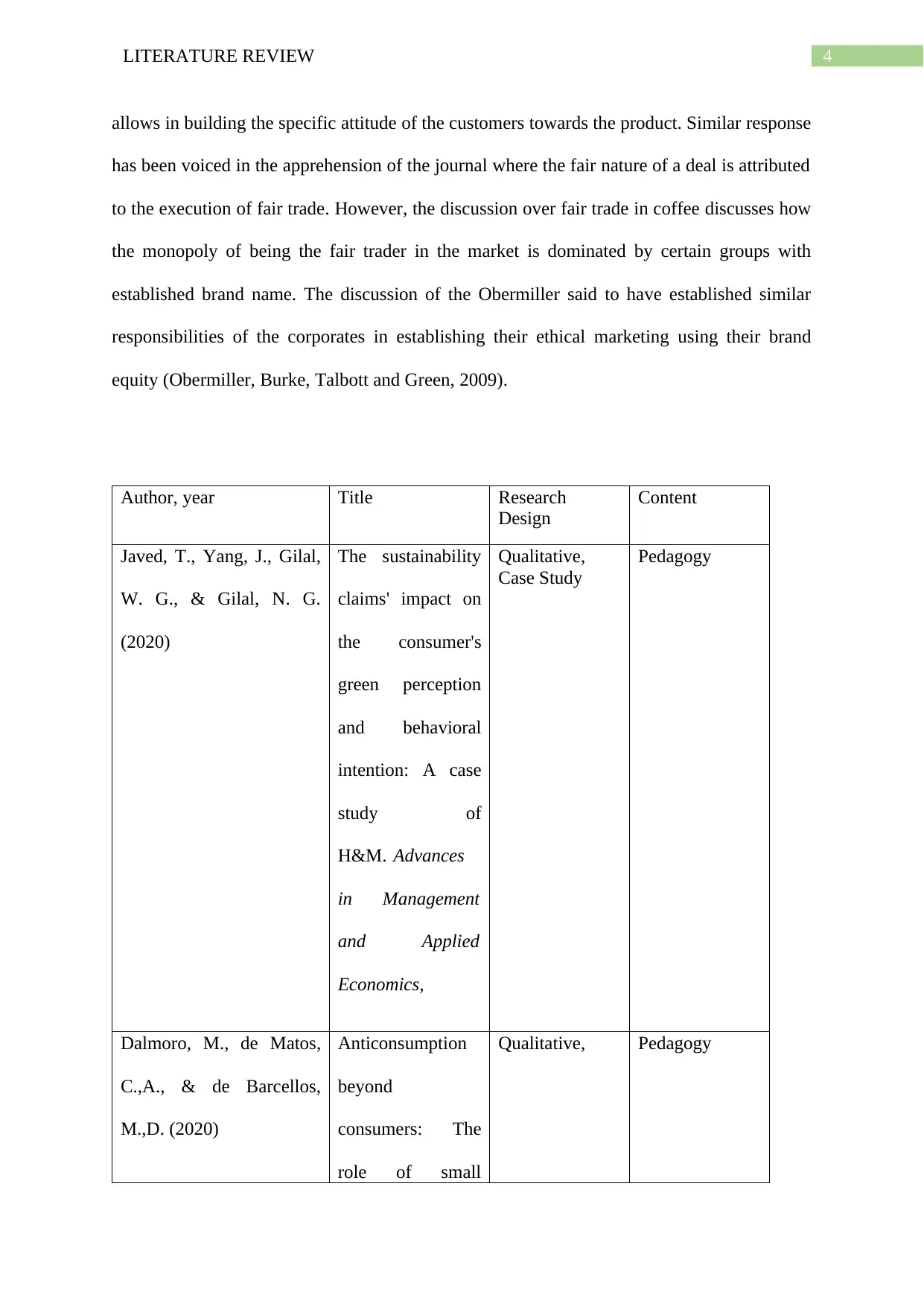
4LITERATURE REVIEW
allows in building the specific attitude of the customers towards the product. Similar response
has been voiced in the apprehension of the journal where the fair nature of a deal is attributed
to the execution of fair trade. However, the discussion over fair trade in coffee discusses how
the monopoly of being the fair trader in the market is dominated by certain groups with
established brand name. The discussion of the Obermiller said to have established similar
responsibilities of the corporates in establishing their ethical marketing using their brand
equity (Obermiller, Burke, Talbott and Green, 2009).
Author, year Title Research
Design
Content
Javed, T., Yang, J., Gilal,
W. G., & Gilal, N. G.
(2020)
The sustainability
claims' impact on
the consumer's
green perception
and behavioral
intention: A case
study of
H&M. Advances
in Management
and Applied
Economics,
Qualitative,
Case Study
Pedagogy
Dalmoro, M., de Matos,
C.,A., & de Barcellos,
M.,D. (2020)
Anticonsumption
beyond
consumers: The
role of small
Qualitative, Pedagogy
allows in building the specific attitude of the customers towards the product. Similar response
has been voiced in the apprehension of the journal where the fair nature of a deal is attributed
to the execution of fair trade. However, the discussion over fair trade in coffee discusses how
the monopoly of being the fair trader in the market is dominated by certain groups with
established brand name. The discussion of the Obermiller said to have established similar
responsibilities of the corporates in establishing their ethical marketing using their brand
equity (Obermiller, Burke, Talbott and Green, 2009).
Author, year Title Research
Design
Content
Javed, T., Yang, J., Gilal,
W. G., & Gilal, N. G.
(2020)
The sustainability
claims' impact on
the consumer's
green perception
and behavioral
intention: A case
study of
H&M. Advances
in Management
and Applied
Economics,
Qualitative,
Case Study
Pedagogy
Dalmoro, M., de Matos,
C.,A., & de Barcellos,
M.,D. (2020)
Anticonsumption
beyond
consumers: The
role of small
Qualitative, Pedagogy
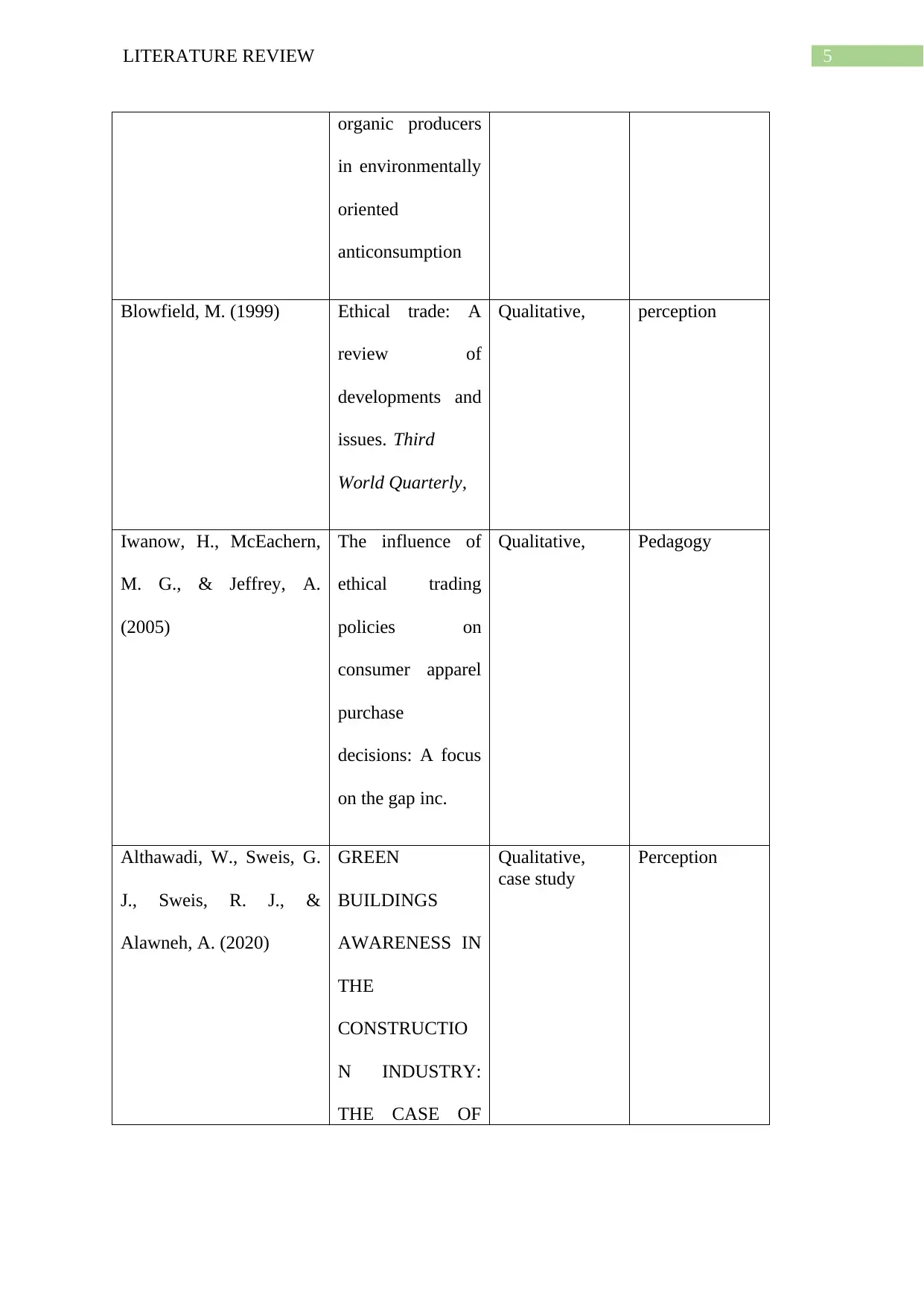
5LITERATURE REVIEW
organic producers
in environmentally
oriented
anticonsumption
Blowfield, M. (1999) Ethical trade: A
review of
developments and
issues. Third
World Quarterly,
Qualitative, perception
Iwanow, H., McEachern,
M. G., & Jeffrey, A.
(2005)
The influence of
ethical trading
policies on
consumer apparel
purchase
decisions: A focus
on the gap inc.
Qualitative, Pedagogy
Althawadi, W., Sweis, G.
J., Sweis, R. J., &
Alawneh, A. (2020)
GREEN
BUILDINGS
AWARENESS IN
THE
CONSTRUCTIO
N INDUSTRY:
THE CASE OF
Qualitative,
case study
Perception
organic producers
in environmentally
oriented
anticonsumption
Blowfield, M. (1999) Ethical trade: A
review of
developments and
issues. Third
World Quarterly,
Qualitative, perception
Iwanow, H., McEachern,
M. G., & Jeffrey, A.
(2005)
The influence of
ethical trading
policies on
consumer apparel
purchase
decisions: A focus
on the gap inc.
Qualitative, Pedagogy
Althawadi, W., Sweis, G.
J., Sweis, R. J., &
Alawneh, A. (2020)
GREEN
BUILDINGS
AWARENESS IN
THE
CONSTRUCTIO
N INDUSTRY:
THE CASE OF
Qualitative,
case study
Perception
⊘ This is a preview!⊘
Do you want full access?
Subscribe today to unlock all pages.

Trusted by 1+ million students worldwide
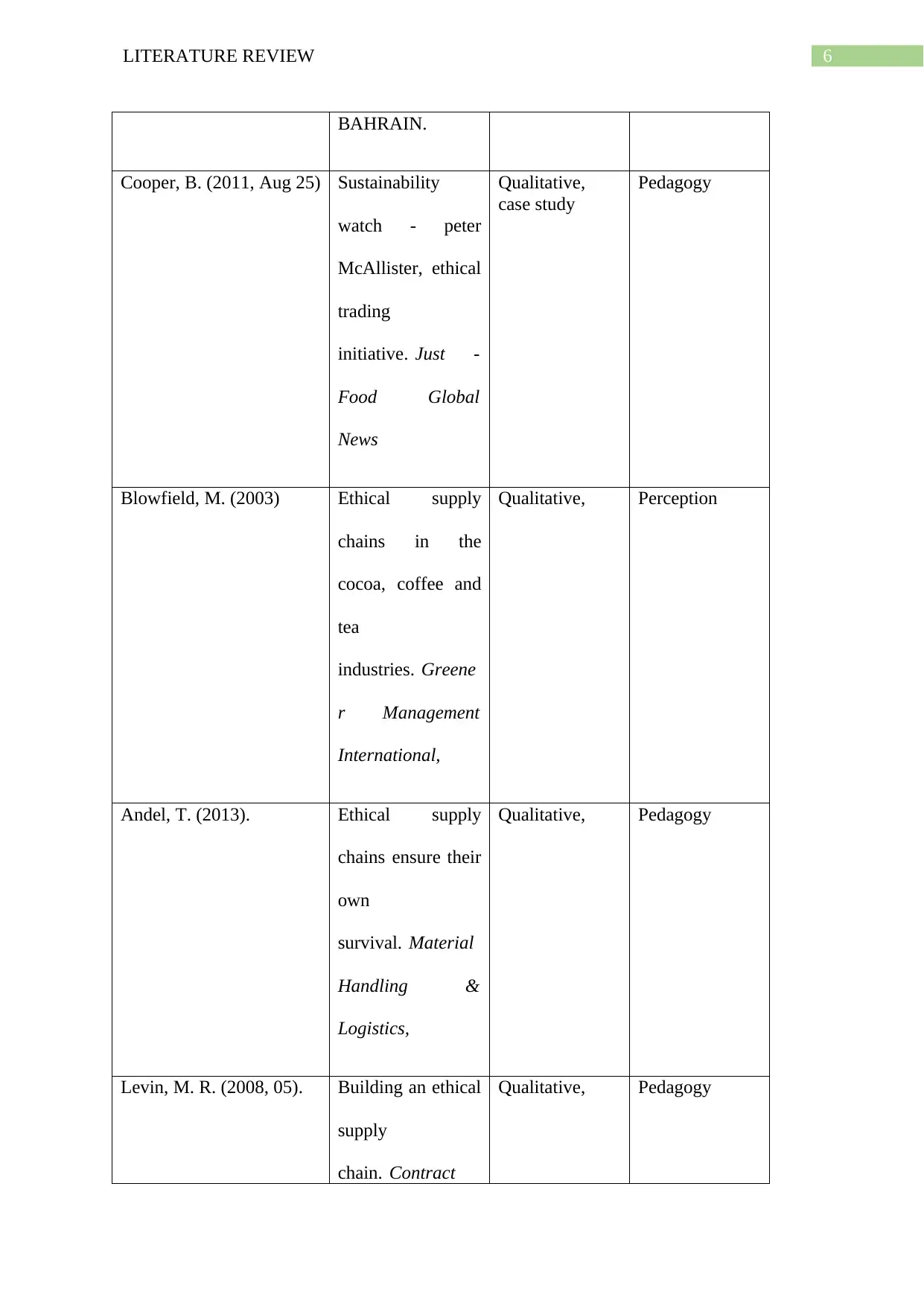
6LITERATURE REVIEW
BAHRAIN.
Cooper, B. (2011, Aug 25) Sustainability
watch - peter
McAllister, ethical
trading
initiative. Just -
Food Global
News
Qualitative,
case study
Pedagogy
Blowfield, M. (2003) Ethical supply
chains in the
cocoa, coffee and
tea
industries. Greene
r Management
International,
Qualitative, Perception
Andel, T. (2013). Ethical supply
chains ensure their
own
survival. Material
Handling &
Logistics,
Qualitative, Pedagogy
Levin, M. R. (2008, 05). Building an ethical
supply
chain. Contract
Qualitative, Pedagogy
BAHRAIN.
Cooper, B. (2011, Aug 25) Sustainability
watch - peter
McAllister, ethical
trading
initiative. Just -
Food Global
News
Qualitative,
case study
Pedagogy
Blowfield, M. (2003) Ethical supply
chains in the
cocoa, coffee and
tea
industries. Greene
r Management
International,
Qualitative, Perception
Andel, T. (2013). Ethical supply
chains ensure their
own
survival. Material
Handling &
Logistics,
Qualitative, Pedagogy
Levin, M. R. (2008, 05). Building an ethical
supply
chain. Contract
Qualitative, Pedagogy
Paraphrase This Document
Need a fresh take? Get an instant paraphrase of this document with our AI Paraphraser
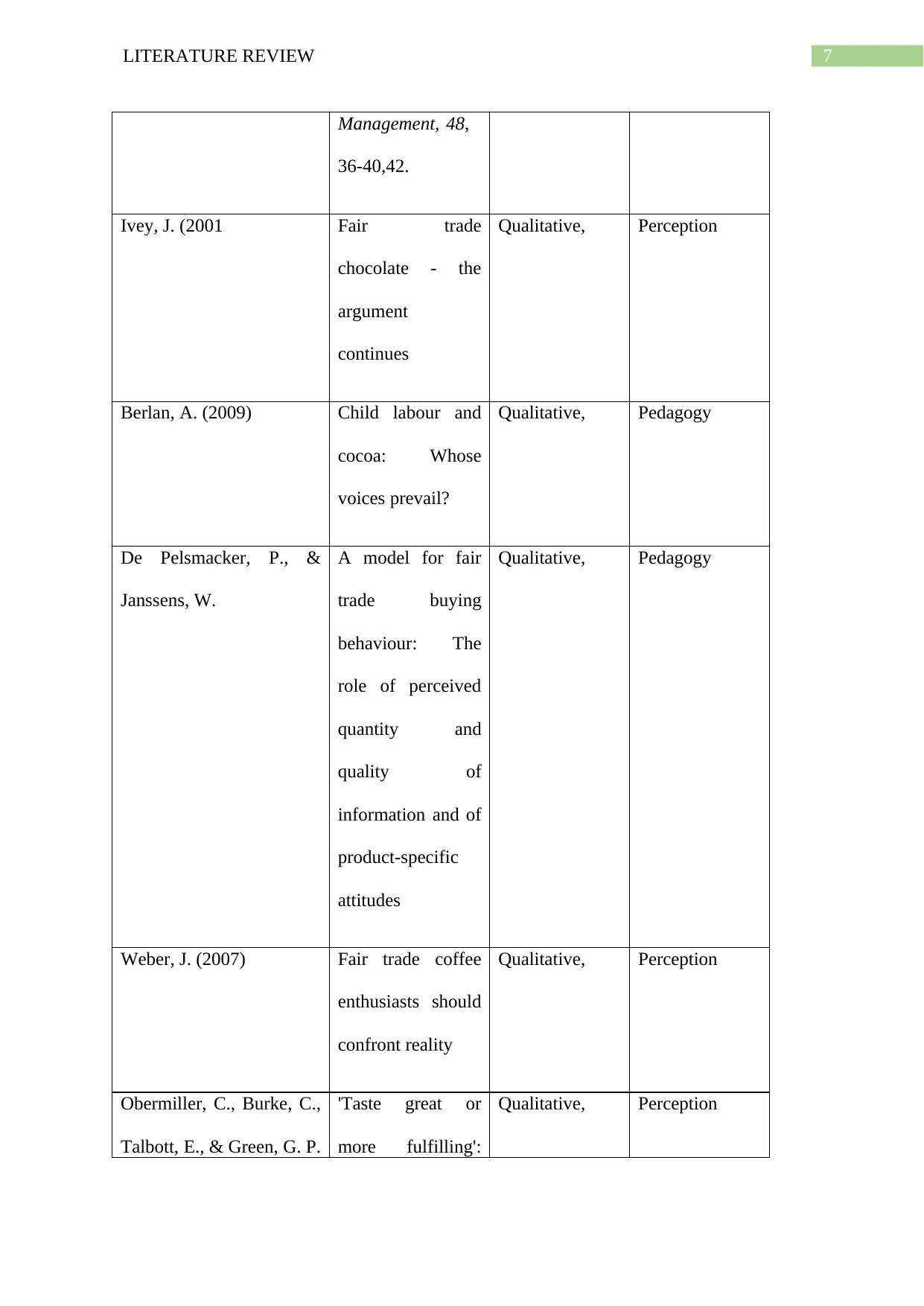
7LITERATURE REVIEW
Management, 48,
36-40,42.
Ivey, J. (2001 Fair trade
chocolate - the
argument
continues
Qualitative, Perception
Berlan, A. (2009) Child labour and
cocoa: Whose
voices prevail?
Qualitative, Pedagogy
De Pelsmacker, P., &
Janssens, W.
A model for fair
trade buying
behaviour: The
role of perceived
quantity and
quality of
information and of
product-specific
attitudes
Qualitative, Pedagogy
Weber, J. (2007) Fair trade coffee
enthusiasts should
confront reality
Qualitative, Perception
Obermiller, C., Burke, C.,
Talbott, E., & Green, G. P.
'Taste great or
more fulfilling':
Qualitative, Perception
Management, 48,
36-40,42.
Ivey, J. (2001 Fair trade
chocolate - the
argument
continues
Qualitative, Perception
Berlan, A. (2009) Child labour and
cocoa: Whose
voices prevail?
Qualitative, Pedagogy
De Pelsmacker, P., &
Janssens, W.
A model for fair
trade buying
behaviour: The
role of perceived
quantity and
quality of
information and of
product-specific
attitudes
Qualitative, Pedagogy
Weber, J. (2007) Fair trade coffee
enthusiasts should
confront reality
Qualitative, Perception
Obermiller, C., Burke, C.,
Talbott, E., & Green, G. P.
'Taste great or
more fulfilling':
Qualitative, Perception
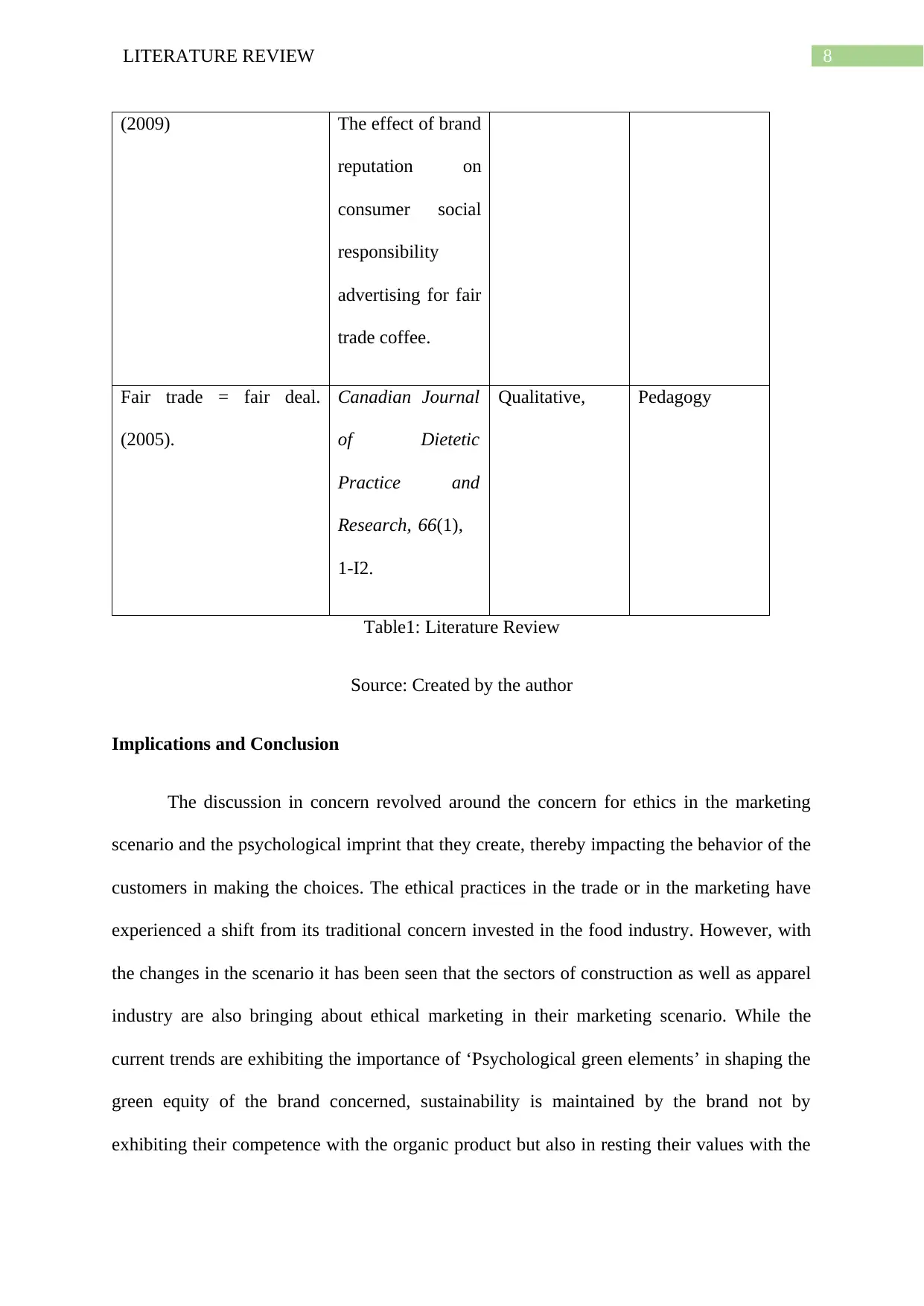
8LITERATURE REVIEW
(2009) The effect of brand
reputation on
consumer social
responsibility
advertising for fair
trade coffee.
Fair trade = fair deal.
(2005).
Canadian Journal
of Dietetic
Practice and
Research, 66(1),
1-I2.
Qualitative, Pedagogy
Table1: Literature Review
Source: Created by the author
Implications and Conclusion
The discussion in concern revolved around the concern for ethics in the marketing
scenario and the psychological imprint that they create, thereby impacting the behavior of the
customers in making the choices. The ethical practices in the trade or in the marketing have
experienced a shift from its traditional concern invested in the food industry. However, with
the changes in the scenario it has been seen that the sectors of construction as well as apparel
industry are also bringing about ethical marketing in their marketing scenario. While the
current trends are exhibiting the importance of ‘Psychological green elements’ in shaping the
green equity of the brand concerned, sustainability is maintained by the brand not by
exhibiting their competence with the organic product but also in resting their values with the
(2009) The effect of brand
reputation on
consumer social
responsibility
advertising for fair
trade coffee.
Fair trade = fair deal.
(2005).
Canadian Journal
of Dietetic
Practice and
Research, 66(1),
1-I2.
Qualitative, Pedagogy
Table1: Literature Review
Source: Created by the author
Implications and Conclusion
The discussion in concern revolved around the concern for ethics in the marketing
scenario and the psychological imprint that they create, thereby impacting the behavior of the
customers in making the choices. The ethical practices in the trade or in the marketing have
experienced a shift from its traditional concern invested in the food industry. However, with
the changes in the scenario it has been seen that the sectors of construction as well as apparel
industry are also bringing about ethical marketing in their marketing scenario. While the
current trends are exhibiting the importance of ‘Psychological green elements’ in shaping the
green equity of the brand concerned, sustainability is maintained by the brand not by
exhibiting their competence with the organic product but also in resting their values with the
⊘ This is a preview!⊘
Do you want full access?
Subscribe today to unlock all pages.

Trusted by 1+ million students worldwide
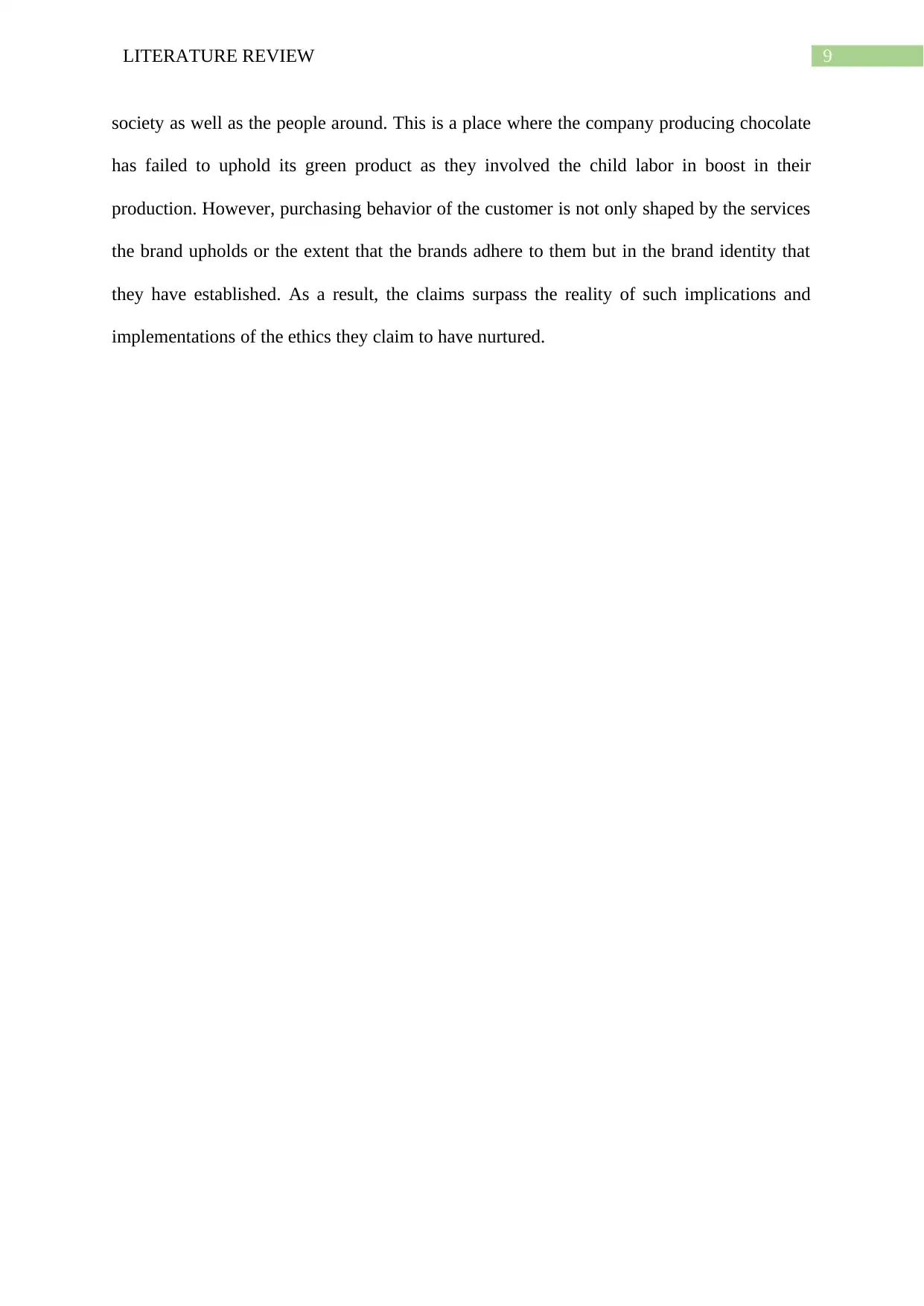
9LITERATURE REVIEW
society as well as the people around. This is a place where the company producing chocolate
has failed to uphold its green product as they involved the child labor in boost in their
production. However, purchasing behavior of the customer is not only shaped by the services
the brand upholds or the extent that the brands adhere to them but in the brand identity that
they have established. As a result, the claims surpass the reality of such implications and
implementations of the ethics they claim to have nurtured.
society as well as the people around. This is a place where the company producing chocolate
has failed to uphold its green product as they involved the child labor in boost in their
production. However, purchasing behavior of the customer is not only shaped by the services
the brand upholds or the extent that the brands adhere to them but in the brand identity that
they have established. As a result, the claims surpass the reality of such implications and
implementations of the ethics they claim to have nurtured.
Paraphrase This Document
Need a fresh take? Get an instant paraphrase of this document with our AI Paraphraser
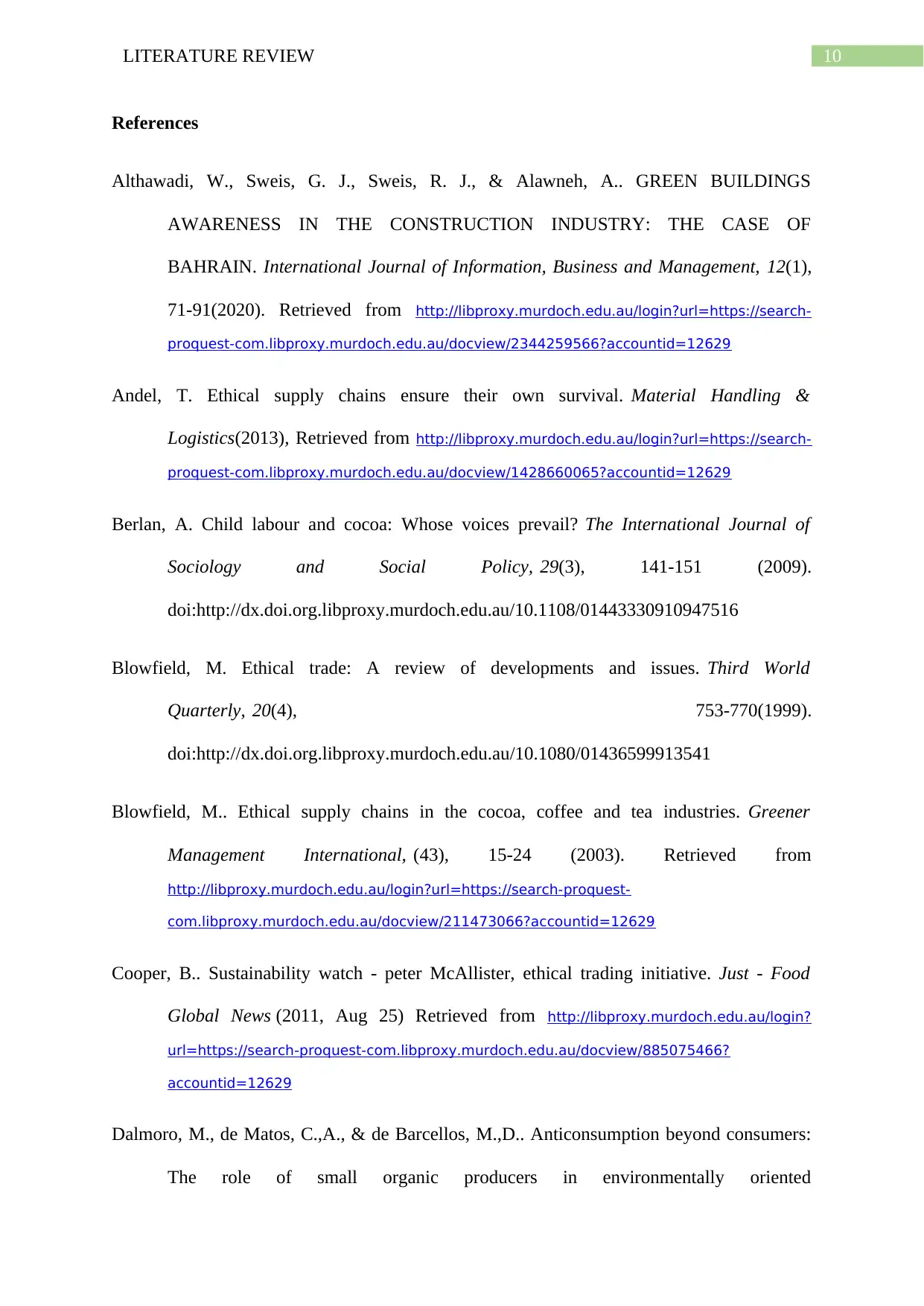
10LITERATURE REVIEW
References
Althawadi, W., Sweis, G. J., Sweis, R. J., & Alawneh, A.. GREEN BUILDINGS
AWARENESS IN THE CONSTRUCTION INDUSTRY: THE CASE OF
BAHRAIN. International Journal of Information, Business and Management, 12(1),
71-91(2020). Retrieved from http://libproxy.murdoch.edu.au/login?url=https://search-
proquest-com.libproxy.murdoch.edu.au/docview/2344259566?accountid=12629
Andel, T. Ethical supply chains ensure their own survival. Material Handling &
Logistics(2013), Retrieved from http://libproxy.murdoch.edu.au/login?url=https://search-
proquest-com.libproxy.murdoch.edu.au/docview/1428660065?accountid=12629
Berlan, A. Child labour and cocoa: Whose voices prevail? The International Journal of
Sociology and Social Policy, 29(3), 141-151 (2009).
doi:http://dx.doi.org.libproxy.murdoch.edu.au/10.1108/01443330910947516
Blowfield, M. Ethical trade: A review of developments and issues. Third World
Quarterly, 20(4), 753-770(1999).
doi:http://dx.doi.org.libproxy.murdoch.edu.au/10.1080/01436599913541
Blowfield, M.. Ethical supply chains in the cocoa, coffee and tea industries. Greener
Management International, (43), 15-24 (2003). Retrieved from
http://libproxy.murdoch.edu.au/login?url=https://search-proquest-
com.libproxy.murdoch.edu.au/docview/211473066?accountid=12629
Cooper, B.. Sustainability watch - peter McAllister, ethical trading initiative. Just - Food
Global News (2011, Aug 25) Retrieved from http://libproxy.murdoch.edu.au/login?
url=https://search-proquest-com.libproxy.murdoch.edu.au/docview/885075466?
accountid=12629
Dalmoro, M., de Matos, C.,A., & de Barcellos, M.,D.. Anticonsumption beyond consumers:
The role of small organic producers in environmentally oriented
References
Althawadi, W., Sweis, G. J., Sweis, R. J., & Alawneh, A.. GREEN BUILDINGS
AWARENESS IN THE CONSTRUCTION INDUSTRY: THE CASE OF
BAHRAIN. International Journal of Information, Business and Management, 12(1),
71-91(2020). Retrieved from http://libproxy.murdoch.edu.au/login?url=https://search-
proquest-com.libproxy.murdoch.edu.au/docview/2344259566?accountid=12629
Andel, T. Ethical supply chains ensure their own survival. Material Handling &
Logistics(2013), Retrieved from http://libproxy.murdoch.edu.au/login?url=https://search-
proquest-com.libproxy.murdoch.edu.au/docview/1428660065?accountid=12629
Berlan, A. Child labour and cocoa: Whose voices prevail? The International Journal of
Sociology and Social Policy, 29(3), 141-151 (2009).
doi:http://dx.doi.org.libproxy.murdoch.edu.au/10.1108/01443330910947516
Blowfield, M. Ethical trade: A review of developments and issues. Third World
Quarterly, 20(4), 753-770(1999).
doi:http://dx.doi.org.libproxy.murdoch.edu.au/10.1080/01436599913541
Blowfield, M.. Ethical supply chains in the cocoa, coffee and tea industries. Greener
Management International, (43), 15-24 (2003). Retrieved from
http://libproxy.murdoch.edu.au/login?url=https://search-proquest-
com.libproxy.murdoch.edu.au/docview/211473066?accountid=12629
Cooper, B.. Sustainability watch - peter McAllister, ethical trading initiative. Just - Food
Global News (2011, Aug 25) Retrieved from http://libproxy.murdoch.edu.au/login?
url=https://search-proquest-com.libproxy.murdoch.edu.au/docview/885075466?
accountid=12629
Dalmoro, M., de Matos, C.,A., & de Barcellos, M.,D.. Anticonsumption beyond consumers:
The role of small organic producers in environmentally oriented
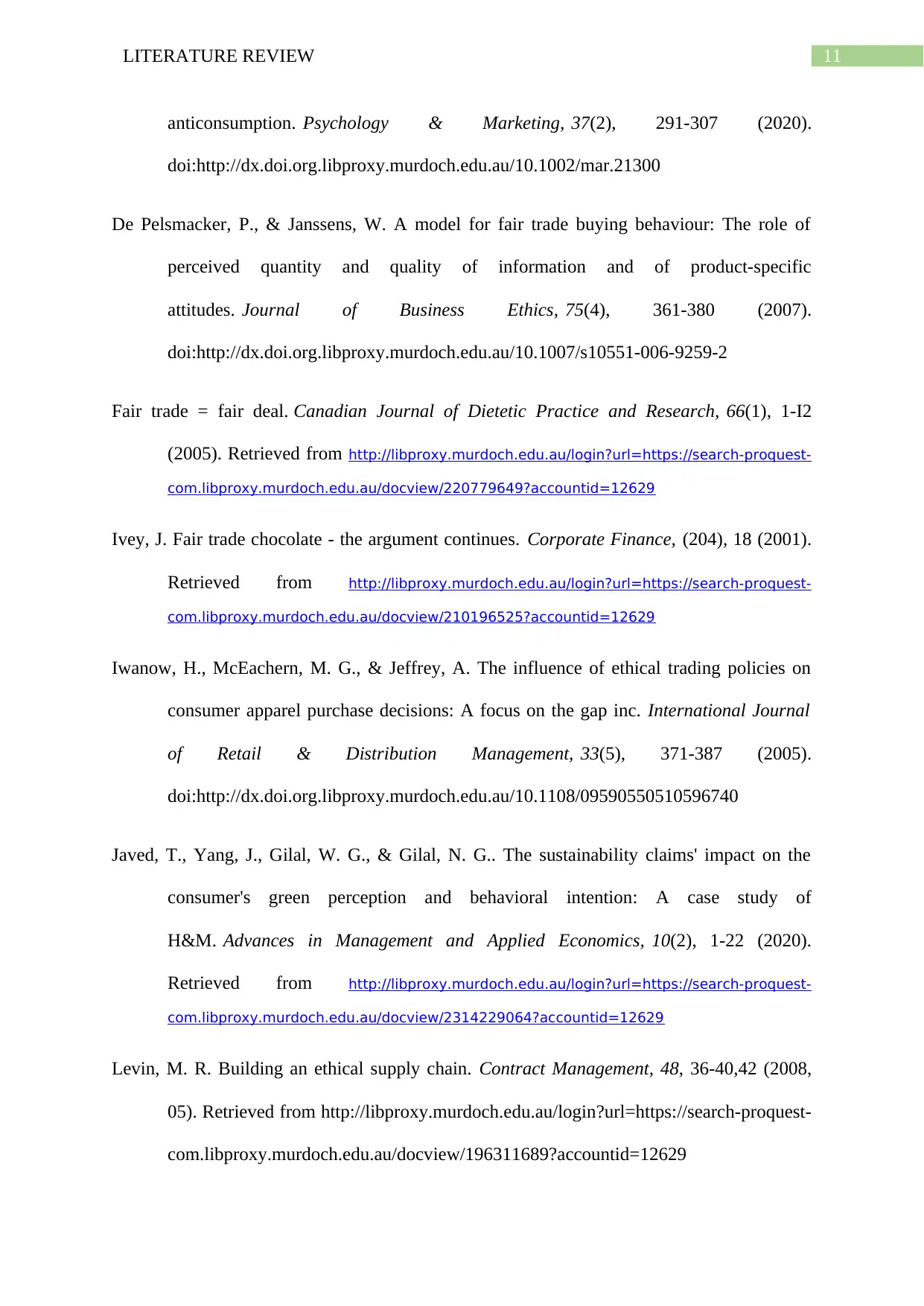
11LITERATURE REVIEW
anticonsumption. Psychology & Marketing, 37(2), 291-307 (2020).
doi:http://dx.doi.org.libproxy.murdoch.edu.au/10.1002/mar.21300
De Pelsmacker, P., & Janssens, W. A model for fair trade buying behaviour: The role of
perceived quantity and quality of information and of product-specific
attitudes. Journal of Business Ethics, 75(4), 361-380 (2007).
doi:http://dx.doi.org.libproxy.murdoch.edu.au/10.1007/s10551-006-9259-2
Fair trade = fair deal. Canadian Journal of Dietetic Practice and Research, 66(1), 1-I2
(2005). Retrieved from http://libproxy.murdoch.edu.au/login?url=https://search-proquest-
com.libproxy.murdoch.edu.au/docview/220779649?accountid=12629
Ivey, J. Fair trade chocolate - the argument continues. Corporate Finance, (204), 18 (2001).
Retrieved from http://libproxy.murdoch.edu.au/login?url=https://search-proquest-
com.libproxy.murdoch.edu.au/docview/210196525?accountid=12629
Iwanow, H., McEachern, M. G., & Jeffrey, A. The influence of ethical trading policies on
consumer apparel purchase decisions: A focus on the gap inc. International Journal
of Retail & Distribution Management, 33(5), 371-387 (2005).
doi:http://dx.doi.org.libproxy.murdoch.edu.au/10.1108/09590550510596740
Javed, T., Yang, J., Gilal, W. G., & Gilal, N. G.. The sustainability claims' impact on the
consumer's green perception and behavioral intention: A case study of
H&M. Advances in Management and Applied Economics, 10(2), 1-22 (2020).
Retrieved from http://libproxy.murdoch.edu.au/login?url=https://search-proquest-
com.libproxy.murdoch.edu.au/docview/2314229064?accountid=12629
Levin, M. R. Building an ethical supply chain. Contract Management, 48, 36-40,42 (2008,
05). Retrieved from http://libproxy.murdoch.edu.au/login?url=https://search-proquest-
com.libproxy.murdoch.edu.au/docview/196311689?accountid=12629
anticonsumption. Psychology & Marketing, 37(2), 291-307 (2020).
doi:http://dx.doi.org.libproxy.murdoch.edu.au/10.1002/mar.21300
De Pelsmacker, P., & Janssens, W. A model for fair trade buying behaviour: The role of
perceived quantity and quality of information and of product-specific
attitudes. Journal of Business Ethics, 75(4), 361-380 (2007).
doi:http://dx.doi.org.libproxy.murdoch.edu.au/10.1007/s10551-006-9259-2
Fair trade = fair deal. Canadian Journal of Dietetic Practice and Research, 66(1), 1-I2
(2005). Retrieved from http://libproxy.murdoch.edu.au/login?url=https://search-proquest-
com.libproxy.murdoch.edu.au/docview/220779649?accountid=12629
Ivey, J. Fair trade chocolate - the argument continues. Corporate Finance, (204), 18 (2001).
Retrieved from http://libproxy.murdoch.edu.au/login?url=https://search-proquest-
com.libproxy.murdoch.edu.au/docview/210196525?accountid=12629
Iwanow, H., McEachern, M. G., & Jeffrey, A. The influence of ethical trading policies on
consumer apparel purchase decisions: A focus on the gap inc. International Journal
of Retail & Distribution Management, 33(5), 371-387 (2005).
doi:http://dx.doi.org.libproxy.murdoch.edu.au/10.1108/09590550510596740
Javed, T., Yang, J., Gilal, W. G., & Gilal, N. G.. The sustainability claims' impact on the
consumer's green perception and behavioral intention: A case study of
H&M. Advances in Management and Applied Economics, 10(2), 1-22 (2020).
Retrieved from http://libproxy.murdoch.edu.au/login?url=https://search-proquest-
com.libproxy.murdoch.edu.au/docview/2314229064?accountid=12629
Levin, M. R. Building an ethical supply chain. Contract Management, 48, 36-40,42 (2008,
05). Retrieved from http://libproxy.murdoch.edu.au/login?url=https://search-proquest-
com.libproxy.murdoch.edu.au/docview/196311689?accountid=12629
⊘ This is a preview!⊘
Do you want full access?
Subscribe today to unlock all pages.

Trusted by 1+ million students worldwide
1 out of 13
Related Documents
Your All-in-One AI-Powered Toolkit for Academic Success.
+13062052269
info@desklib.com
Available 24*7 on WhatsApp / Email
![[object Object]](/_next/static/media/star-bottom.7253800d.svg)
Unlock your academic potential
Copyright © 2020–2025 A2Z Services. All Rights Reserved. Developed and managed by ZUCOL.





